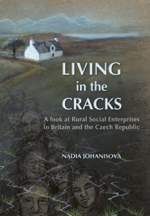Juxtaposition, encounter and drift: transformative social innovation through culture and the arts
This paper aims to tentatively explore the benefits of placing art’s knowledge-building tradition, with its capacity to disrupt and reframe, at the centre of how we look at alternative organizing and alternative economic spaces, positioning lived experience, its uncertainties intact, at the heart of researching and practicing social enterprise (SE). The paper explores indeterminacy through two case-study narratives, one of an academic arts-based research project and the other of a unique organization it encountered.

